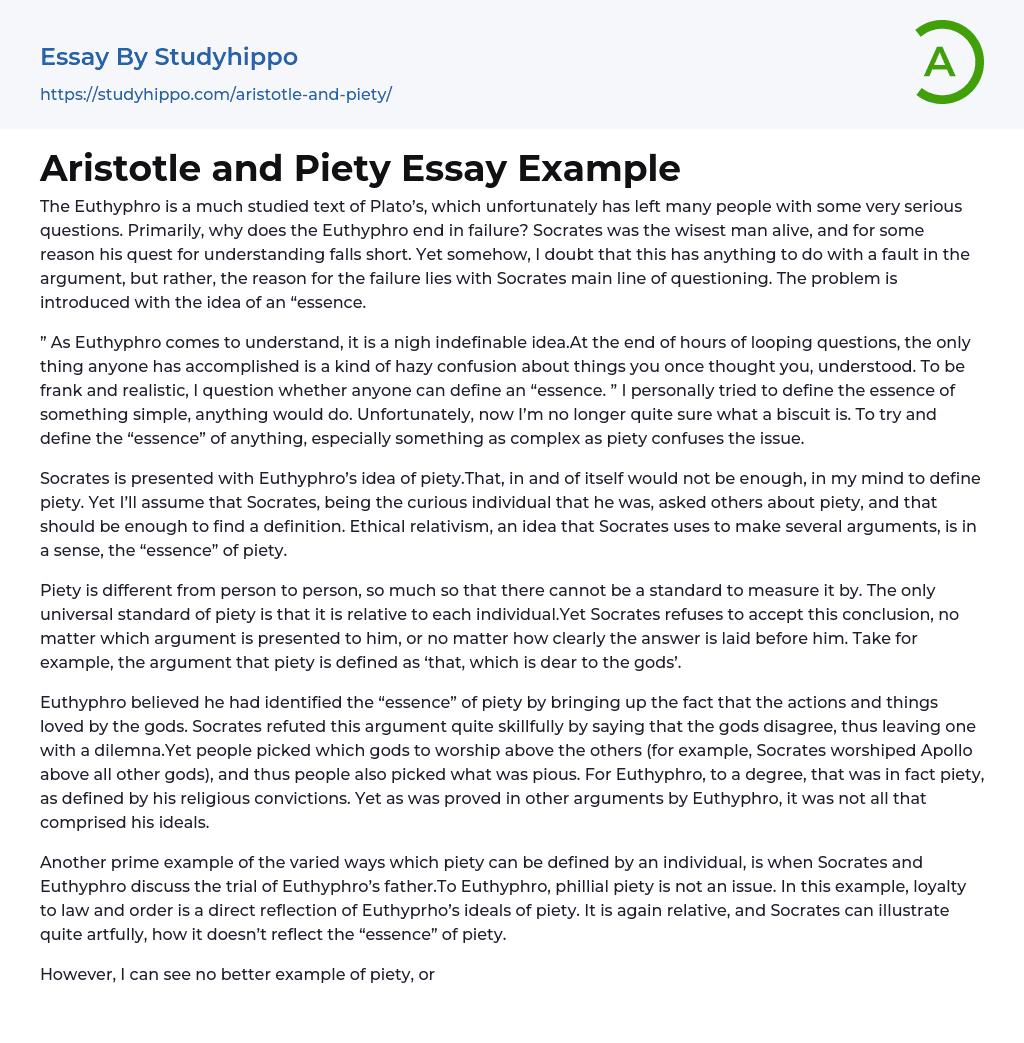Plato's text, the Euthyphro, has been widely analyzed, but its conclusion remains ambiguous to many. The primary issue is why it ultimately fails. Although Socrates is regarded as the most intelligent person, his quest for knowledge falls short. Nonetheless, I contend that the failure does not stem from a defect in the argument but rather originates from Socrates' initial line of inquiry regarding the notion of "essence."
"It is almost impossible to define the idea," Euthyphro realizes after hours of questioning. With no clear definition, confusion sets in about previously understood concepts. Personally attempting to define the essence of something simple has even left them unsure of what a biscuit truly is. Defining the "essence" of such a complex idea as piety only further complicates things.
Socrates received Euthyphro's concept of piety, but he believed it was insuffi
...cient to define it. Despite this, Socrates inquired about piety from others as he is an inquisitive person. The "essence" of piety, which Socrates utilizes to make various arguments, is ethical relativism.
Although piety is subjective and does not have a universal standard of measurement, Socrates rejects this idea. He does not accept any argument or explanation presented to him, including the suggestion that piety is defined as 'that which is dear to the gods'.
Euthyphro's belief was that the essence of piety lay in the actions and things that were favored by the gods. However, Socrates countered this argument by pointing out the disagreement amongst the gods, thereby presenting a quandary. Nevertheless, individuals chose to worship certain gods over others (such as Socrates worshiping Apollo above all other gods), and thus had their own interpretations of what constitute
piety. For Euthyphro, this aligns with his religious convictions and was in fact a part of his definition of piety. However, it was not the entirety of his ideas, as he demonstrated in other arguments.
When Socrates and Euthyphro converse about Euthyphro's father's trial, a prime example is presented on the various ways an individual can define piety. For Euthyphro, filial piety is not pertinent. Instead, loyalty to law and order exemplifies his ideals of piety. This example highlights the relativity of piety, and Socrates skillfully demonstrates how it doesn't embody the "essence" of piety.
Despite being an example of piety, the actions of Euthyphro highlight a lack of ethical relativism as he follows his own personal ideal without considering other perspectives. Socrates questions the validity of this approach and points out that an argument without a clear answer will lead to no conclusion. Additionally, constantly disputing a recurring answer in different arguments will make it challenging to find a sensible solution.
The actions of Socrates in the Euthyphro can be likened to a mathematician who acknowledges pi as a calculation tool but denies it as a numeral. It is possible that Socrates intentionally left the matter open-ended, hoping that individuals would come to their own conclusions on the subject.
- Values of Life essays
- Ethical dilemma essays
- Normative Ethics essays
- Virtue Ethics essays
- Belief essays
- Deontology essays
- Moral essays
- Virtue essays
- Work Ethic essays
- Albert Camus essays
- Aristotle essays
- Carl Jung essays
- Henry David Thoreau essays
- Immanuel Kant essays
- John Dewey essays
- Karl Marx essays
- Machiavelli essays
- Michel Foucault essays
- Plato essays
- Rene Descartes essays
- Rousseau essays
- Socrates essays
- Thomas Hobbes essays
- Acceptance essays
- Age Of Enlightenment essays
- Child Observation essays
- Confucianism essays
- Conscience essays
- Critical Reflection essays
- Destiny essays
- Determinism essays
- Empiricism essays
- Environmentalism essays
- Epistemology essays
- Ethics essays
- Ethos essays
- Existence essays
- Existentialism essays
- Fate essays
- Free Will essays
- Functionalism essays
- Future essays
- Good And Evil essays
- Human Nature essays
- Individualism essays
- Meaning Of Life essays
- Metaphysics essays
- Natural Law essays
- Personal Philosophy essays
- Philosophers essays




